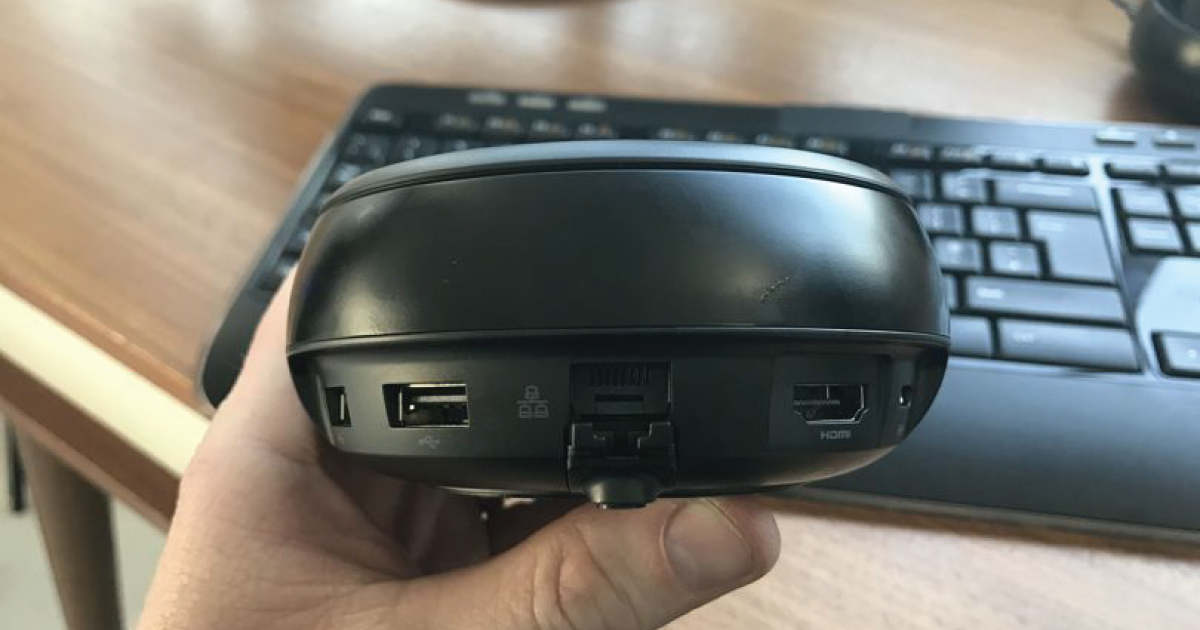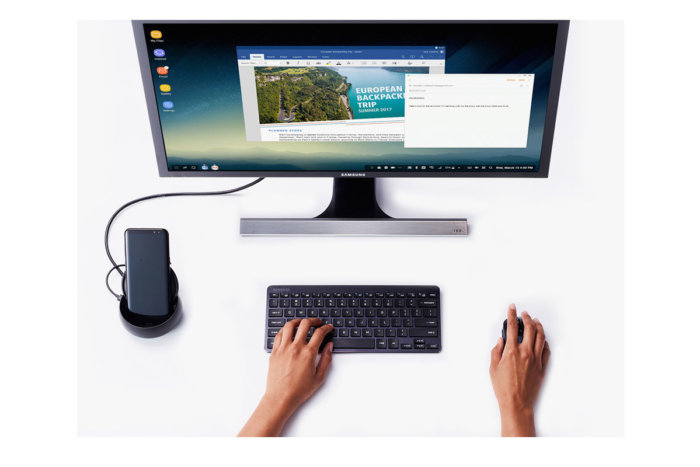
If you read my blogs, you know that I am somewhat passionate and somewhat of a strong believer in convergence. To recap, technology convergence is the concept of having one single device for all your technology needs. Today, most people have a desktop computer AND a smartphone AND MAYBE a laptop, a tablet, an iPod, an e-reader, a gaming console, a camera, VR, and quite possibly some other device(s) for their growing list of technology needs.
The problem with a segregated technology life is that you end up having bits and bytes (and sometimes chunks) of information and data spread out on various hard drives and/or ‘in the cloud’ AND you have to carry around multiple devices to complete multiple tasks. Whereas one device, like a laptop accomplishes many tasks, it fails to accomplish all tasks AND can be a challenge to lug around (see: U.S. Suddenly Bans Laptops and Tablets on Some Middle Eastern Flights to America). And whereas one device, like a smartphone, fails to provide the necessary capabilities to do ‘real work’ or play ‘real games’, it is portable and convenient. The theory of convergence is that there could be one device that would provide both the capabilities to ‘do everything’ while fitting nicely inside your pocket or purse. While some see this as a fairytale, I (and others) see this as the ‘next big step in the evolution of technology’.
So, it came as a bit of a surprise last week to many people when Samsung made their big announcement. No, it’s not the Galaxy S8 (hard to miss with all the leaks and hype). No, it’s not Samsung’s most stringent 8-point battery testing (that’s trending on FaceBook and the source of many memes). What I am referring to is the Samsung DeX docking station. What, by gosh, is the DeX, you ask??? DeX is a docking station that extends the capabilities of the Galaxy S8 from being a premier smartphone into a desktop environment. With ports for Ethernet, HDMI, and USB as well as Bluetooth or RF for keyboard and mouse, the DeX is positioning itself to become that ‘next step’ in the technology evolution. You may be asking yourself, ‘Why is even ‘a thing’?’ Well, smartphone hardware is becoming powerful enough to be comparable to the laptops of 2010. And because laptops have remained relatively unchanged (yes, laptops have gotten faster processors, sharper displays, larger hard drives, thinner and lighter; but significantly better, I’d argue no!), a smartphone that provides comparable performance to a laptop from 2010 is still relatively useful for 90 percent of the computing population. In providing a docking station that is capable of making your smartphone the center of your technology universe, Samsung is hoping to grab the first mover market share of what is likely to become a very crowded market space.

To be clear, the DeX is likely to be a footnote in the annals of technology history much like Psion’s Series 3 (the very first PDA) or the Simon Personal Communicator by Bellsouth (the very first smartphone). While few have even heard of these devices, these are the devices that grandfathered the technology that is so very prevalent in our lives today. The DeX is likely to become the first salvo in making both laptops and tablets (as we know them today) obsolete. And again, DeX is merely the catalyst. Samsung is not the first to think of a DeX like solution, but they are the first to put it into production and tie it to a flagship smartphone (Galaxy S8). Other companies, like Apple, HTC, LG, and Motorola, will follow suit in the coming months and years making significant improvements to their versions of convergence along the way so that in a relatively short period of time with each passing revision, this technology will improve, adapt, and grow to the point where we can’t live without it. Remember, the first iPods were clunky (the touch wheel); the first laptops were HUGE (weighing 60 pounds); and the first cell phones were as big as bricks (literally as big as bricks); but over time, these devices became refined, even elegant, while became more and more prevalent in our everyday lives. Within a few short years, the smartphone has already become the communication tool of choice for voice and e-mail, our media player; our web browsing device; and our camera. It’s with that prevalence that it’s almost too easy to imagine smartphones absorbing the role of our desktop/laptop computer and becoming the ‘all-in-one’ solution that consumers crave.
So really, what is DeX? In my mind, Samsung just delivered the first (of what will be many) real solution for replacing a significant number of devices in a relatively short period of time while making tablets and laptops technology dinosaurs. Doubt me??? Imagine having one device for all your technology needs: phone, e-mail, entertainment, web browsing, productivity applications, and games. Now imagine that device being as portable as your laptop, as powerful as your desktop computer, and as connected as your smart phone. Now imagine that device being able to fit into your pocket or purse and connecting into a docking station when you require a monitor (or television), keyboard (or voice input), and/or mouse (or hand gestures). If I am right, why would you buy a new laptop over a smartphone that can easily deliver a comparable laptop experience? That’s why I think DeX is poised to significantly impact your lives the same way the Internet has done since in the early 1990’s, iTunes has done since in the early 2000’s, and smartphones have done FOR THE past 15 years.
But, I don’t think Samsung went far enough. The DeX is far from perfect. Mind you, I have not yet tried DeX, but I can elaborate a bit on where Samsung fell short. First, Samsung is using Android as both the OS for the phone and the desktop experience. I think the better solution would have been to use Android for the smartphone and ChromeOS for the desktop. This provides end users with a desktop solution for their desktop needs. In stretching Android in this way, Samsung is essentially limiting the desktop experience. Second, I would have pushed for an Intel processor. BUT… Intel doesn’t make phone processors anymore… EXACTLY!!! I’d stop treating the device as a phone; but instead, treat the device to be MORE THAN A PHONE!!! Give it the raw power and capabilities of a laptop in a smartphone form factor and you’ll create a device that is MORE THAN A PHONE!!! The Intel processor would also potentially allow for the ability to run Windows based applications. HUH?? WHY WOULD I WANT TO DO THAT? Because this device could become a laptop / desktop replacement in a few short years; but to do so, it has to run the applications that run the world (and for better or worse those are Windows applications). Next, I’d give the docking station real power by adding an external graphics card which would immediately improve desktop-like performance and meet the requirements of more high-end applications and games. If you include two USB-C ports, you can future proof the docking station to run a greater number of future peripherals and accessories. AND ADD CHROMECAST, and you could project your phone onto any television on the same network!!! HMMMM…… Now, you have a laptop killer. You have an all-in-one device. You have the best smartphone OS coupled with a respectable desktop OS. AND, you have sacrificed nothing (well, maybe almost nothing) in the process.
I can see it. Again, I’ve stated this for years that this type of solution is coming. While I have little control over the technology world around me, I am preparing CodeWeavers for this ‘brave new world’. Me being a strong advocate for our CrossOver Android product, our solution for running Windows applications on Android and ChromeOS, is my attempt at getting our company positioned to be part of this converging technology evolution. If the technology universe unifies on Android or ChromeOS as being the platform, utilities, like CrossOver, will be essential in providing users with the ability to run ‘their applications’ until such a time where these applications are no longer useful or fully updated. Until that time, our technology will be useful, even necessary, in pulling all the little pieces together. And how does an evolution take shape, with a thousand little pieces all coming together at the exact same time. We’re all about to witness the next great thing in technology and it’s MORE THAN A PHONE!!!
About James B. Ramey
James B. Ramey is the CEO of CodeWeavers. His life long love of video gaming started at the tender age of six with an Atari 2600 and evolved over time to include Nintendo, Super Nintendo, Apple Mac IIc, Windows PC, and MacBook Pro. When not fiddling with technology, James enjoys cooking, travel, debating politics in the office, and spending time with his wife, daughter, and their two rescue dogs. For the past 20 years, James has worked with clients around the world in best implementing technology to maximize a return on their investment. He is a graduate of Moorhead State University and earned his MBA from the University of Phoenix. You can find James on Twitter at @jbramey.

 James Ramey
James Ramey
